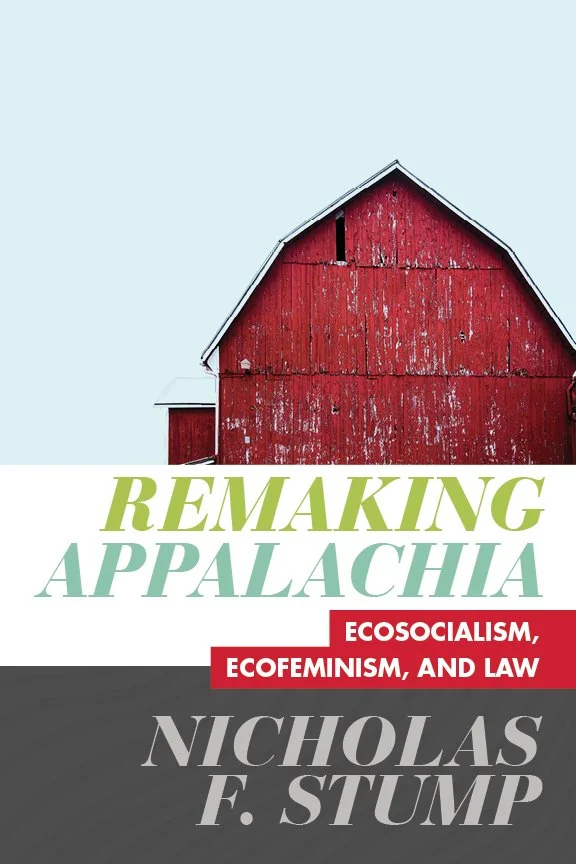I am the author of Remaking Appalachia: Ecosocialism, Ecofeminism, and Law. This book was a Weatherford Award Finalist. Read the book launch transcript published with UCLA Law Review Discourse.
Read my latest article “Ecosocialism, Degrowth, and Global South Thought: Critical Legal Transformations” with William & Mary Environmental Law and Policy Review. View my latest course “Law, Social Movements, and Social Change.”
“Remaking Appalachia offers a thorough critical account of Appalachia through a law and political economy lens, and makes a persuasive case for what the region needs today: a hopeful vision for a new future rooted in transformative, bottom-up change.” -Ann M. Eisenberg, Associate Professor, University of South Carolina
“Stump bases his text upon an impressive foundation of nearly 400 sources, writes in a clear manner, and provides valuable contributions to the fields of
environmental law and Appalachian studies, while demonstrating an expert command of the
principles of ecofeminism and ecosocialism.” -Barry L. Tadlock, Professor, Ohio University
“Stump offers more than criticisms of environmental law and extractive industries and presents ways to redress harm and reimagine environmental and economic structures in Appalachia.” -Z. Zane McNeill, Scholar-Activist, Editor of Y’all Means All: The Emerging Voices Queering Appalachia
“With Remaking Appalachia, Nicholas F. Stump offers a powerful critique of environmental law and policy in Appalachia and advances new models for a just transition toward alternative social and economic policies.” -Joseph D. Witt, Associate Professor, Mississippi State University, Author of Religion and Resistance in Appalachia
“A must-read for anyone concerned about our reliance on unsustainable energy sources and environmentally damaging practices, and what can be done about it.” -Margaret Kiel-Morse, Faculty Services Librarian, Indiana University Maurer School of Law
“Stump’s ambitious and challenging work reimagines the commons – the cultural and natural assets accessible to all members of society – in innovative ways but also imbibes from previous intellectual frameworks and Appalachia’s own robust activist tradition.” -Gonzalo Baeza, Author, with fiction published in Boulevard and The Texas Review
“Stump’s review of environmental law is detailed, illustrating how it has done more harm than good through government complicity in, e.g., ‘institutional capture,’ built-in exceptions for polluting industries, and inclusion of extra, often implicit, subsidies for fossil-fuel businesses.” -Fred J. Hay, Professor of Appalachian Studies, Appalachian State University
“The spirit common to all the strategies that Stump proposes involves, what the folklorist Mary Hufford would characterize as interrupting the monologue. Rather than elites (whether insiders or outsiders) dictating the issues to be addressed and how to solve them, these strategies entail sharing power between lawyers, activists, or whomever and the broader citizenry.” -Austin Miles, Author, with essays published in Undisciplined Environments and Edge Effects
Summary
Environmental law has failed spectacularly to protect Appalachia from the ravages of liberal capitalism, and from extractive industries in particular. Remaking Appalachia chronicles such failures, but also puts forth hopeful paths for truly radical change.
Remaking Appalachia begins with an account of how, over a century ago, laws governing environmental and related issues proved fruitless against the rising power of coal and other industries. Key legal regimes were, in fact, explicitly developed to support favored industrial growth. Aided by law, industry succeeded in maximizing profits not just through profound exploitation of Appalachia’s environment, but also through subordination along lines of class, gender, and race. After chronicling such failures and those of liberal development strategies in the region, Remaking Appalachia explores true system change beyond law “reform.” Ecofeminism and ecosocialism undergird this discussion, which involves bottom-up approaches to transcending capitalism coordinated from local to global scales.
